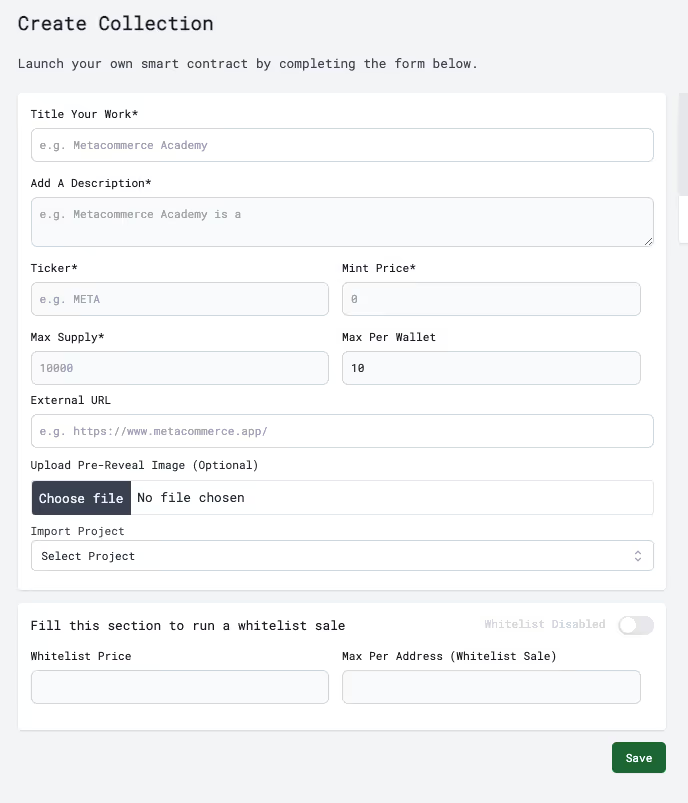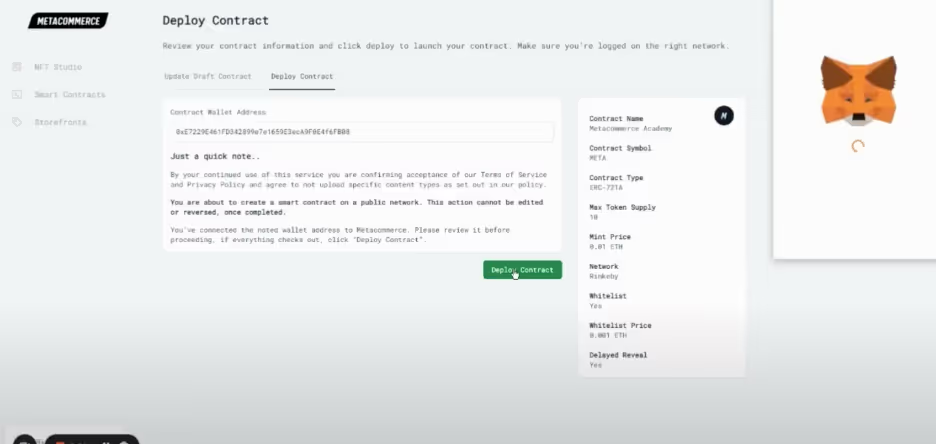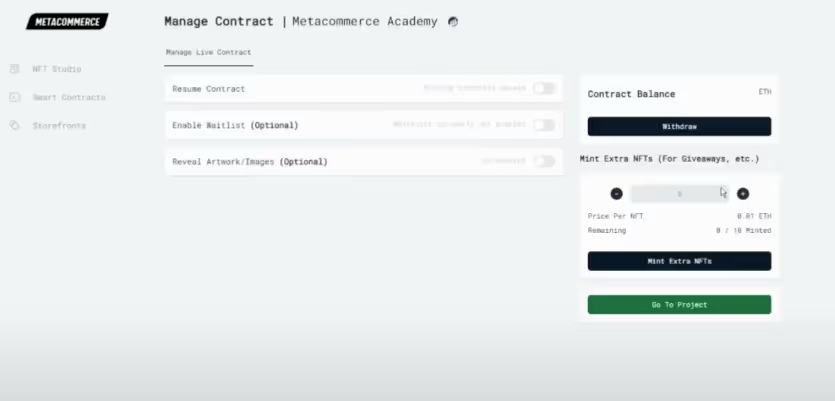
What is a Smart Contract?
What is a smart contract?
If you have spent any time looking into web3, have explored NFTs or completed transactions on the blockchain, you will probably have come across mentions of smart contracts.
If you are looking to launch your own NFT collection, it’s very important that you understand what a smart contract is and how they function. With the Metacommerce Studio, you can easily create your own smart contracts without the need to write any code, but it’s important that you understand the role they play in your NFT project.
In this post we will cover:
- What is a smart contract?
- Which chains support smart contracts?
- What languages are smart contracts written in?
- How are smart contracts used?
- How to deploy your own smart contract with the Metacommerce Studio.

What is a smart contract?
Smart contracts are a type of programme that runs on the blockchain. They act as an account and therefore exist at a specific address on the blockchain, but they are not operated by a human. They operate according to code, written in a smart contract language, which is made up of a collection of data and functions, which tell them how to execute.
Smart contracts are fundamental building blocks of the blockchain infrastructure. They act in a very logical way, following “if / then” structure, and operate exactly according to these rules and cannot be changed.
The reason they are so useful is that they can repeatedly perform functions without the need for an intermediary or a third party. Think of them like little machines that reliably complete the same task or transaction.
Think about an ATM: you insert your card, your PIN number and the amount of money you want to withdraw and the ATM processes the transaction and gives you your money. There is no need for a bank teller, and you can trust the ATM to reliably execute its role. A smart contract is the same, but a code based machine on the blockchain.
When you deploy a smart contract, remember you are writing to the blockchain so you will need to pay the required gas fees.

Why are they called smart contracts?
They are not contracts in the legal sense (i.e. a long document testifying to an agreement); the word “contract” refers to the fact that the smart contract is an agreement to execute a process in a certain way.
Which chains support smart contracts?
Ethereum is the most well known for supporting smart contracts, and is seen as the most respected, but other blockchains do support smart contracts:
- Solana
- Tezos
- Hyperledger
- Stellar
- Polkadot
What languages are smart contracts written in?
Solidity is one of the most prevalent smart contract languages, and it is active and well maintained. Vyper is also popular.
Other smart contract languages include Yul and Fe, although these are less common.
Why are smart contracts important?
Smart contracts bring loads of benefits to those who work with them. Since they are a fundamental part of many blockchains, the way they function is in line with lots of the beliefs and core characteristics of web3.
Here are 5 reasons that smart contracts are important (and helpful!):
- They don’t rely on corruptible parties to execute them
Since there is no human operator, and the smart contract operates according to predetermined and visible code, there is no chance of corruption since a computer programme can have no self-interest or ulterior motive. - They execute automatically
Since the code operates based on pre-written instructions, it runs automatically. These means that transactions can be completed quickly and without dependency. - They can act as a public record (on the Ethereum blockchain)
On public blockchains, smart contracts keep records of all transactions that have been completed, giving transparency. - You can operate pseudonymously
On the blockchain you are able to operate as a pseudonymous user. Since you are interacting with smart contracts rather than people, you do not need to reveal your identity. - You can understand the terms up front
Since the smart contract’s code is predetermined, you are able to understand how it will work before you interact with it.
Why are smart contracts used when launching an NFT collection?
When you allow users to start minting NFTs from your collection, you want to automatically verify and process the transactions; this is why you use a smart contract. You are able to
These smart contracts assign ownership and manage how these NFTs can be transferred in the future. When you mint an NFT, you are executing code stored in a smart contract. This information is added to the blockchain.
Sometimes, the initial smart contract sets up a royalty function, meaning that each time the NFT is sold, or transferred, the creator is rewarded with royalties.
How to create your own smart contract
Now you know what a smart contract is, how they are helpful, and what the mean when selling NFTs, it’s time to create your own. This process is incredibly easy with Metacommerce Studio - it can be done in less than 5 minutes - and no coding is required.
So let’s get started!

When you log into the platform you'll first want to go to smart contracts and hit “create smart contract” from there.

You'll be able to input some basic information on your collection including your collection title, collection description, the ticker name for your contract, the max supply of your contract, the mint price as well as the white list price if you have one.
From there you can then upload a delayed reveal image if you want to use one as well as associate your respective NFT project (the one of ones or the generative collection that you created in the previous step) with the contract. Once this is added to the contract when users mint they're minting from that respective project.
Once you've uploaded both the delayed reveal image and the actual NFTs you can flip back and forth and see what this is going to look like for your user. We've also provided a section to address white listing where you can add a white list price as well as the max number that people can mint at the whitelist stage.
Once you've hit save you can then review your contract and then proceed to actually deploying it on the mainnet.

This is as simple as connecting via Metamask and paying the respective transaction fees. We've done a ton of optimizations on this front to reduce the cost of smart contracts, although the cost to deploy a contract will fluctuate.

Once you've deployed your contract, you're given a back end to manage your contract: from launching your actual drop by unpausing the contract, to minting NFTs for giveaways or your treasury, to embedding your minting contract in an existing site. Metacommerce provides the solutions to manage it all the way through as well as actually check your contract on etherscan after the fact.
When you deploy a contract with metacommerce you own the contract associated with your wallet and you take full ownership of that experience and the work that you build on top of it.
And that’s it
That’s all you need to know about smart contracts to get started. We now know what smart contracts are, how they are useful and how to deploy them in the Metacommerce Studio.
Over to you
Now it’s time for you to get started building smart contracts; it’s time to head over to the Metacommerce Studio to start creating. And it’s free until you want to mint!





